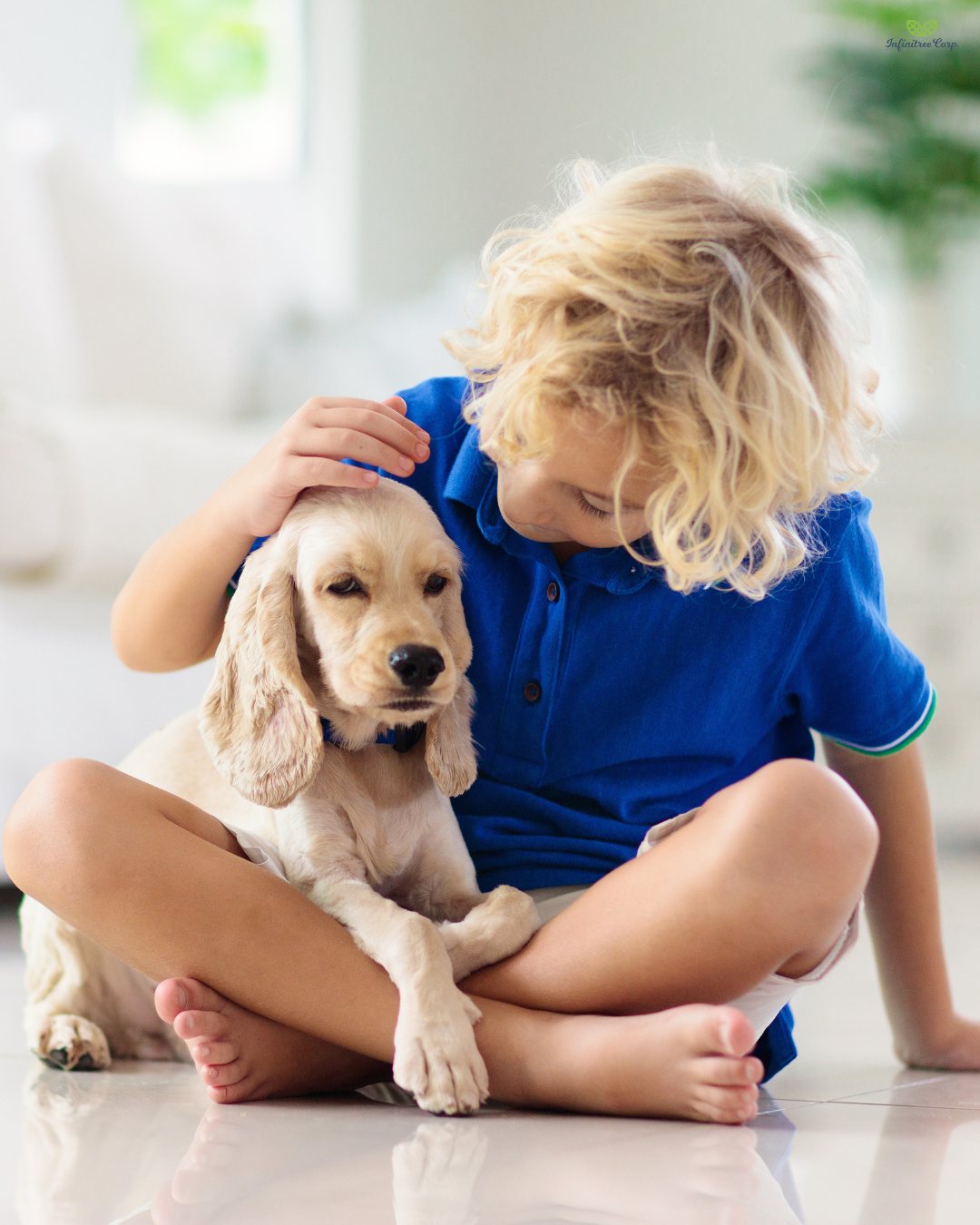
The Benefits of Pet Care on Kids’ Responsibility and Physical Health
InfinitreeEditor.Jo
The Benefits of Pet Care on Kids’ Responsibility and Physical Health
The Day We Brought Home a Puppy
When we brought home Max, our energetic golden retriever, I wondered if my kids truly understood the responsibility they were taking on. At first, there were a lot of messes, missed feeding times, and reminders to walk him. But slowly, something changed. My kids began waking up early to feed Max and eagerly took turns walking him around the block. They started taking ownership, and I noticed a shift—not only were they more responsible, but they were also more active and engaged.
Taking care of a pet didn’t just give us a furry friend; it gave my kids a chance to learn, grow, and thrive.
Teaching Responsibility and Encouraging Physical Activity
In today’s fast-paced world, it can be challenging to help kids develop life skills and stay active. Common challenges include:
- Lack of Accountability: Kids may struggle with sticking to chores or responsibilities without motivation.
- Sedentary Lifestyles: Many children spend hours sitting due to school, screen time, and homework.
- Emotional Disconnection: Stress and anxiety can make it harder for kids to stay positive and engaged.
Caring for a pet can address these challenges by fostering responsibility, empathy, and physical activity in a natural and enjoyable way.
How Pet Care Benefits Kids’ Growth
-
Responsibility and Routine
- Taking care of a pet requires daily tasks like feeding, grooming, and exercising, helping kids build a sense of accountability.
-
Physical Health
- Walking, playing with, and caring for pets encourages regular movement, which improves cardiovascular fitness, strength, and coordination.
-
Emotional Well-being
- Pets provide unconditional love, reducing stress and anxiety. The routine of caring for a pet can also promote a sense of stability and comfort.
-
Social Skills
- Pets can act as social bridges, encouraging kids to interact with others during walks or visits to the park.
-
Time Management and Problem-Solving
- Balancing pet care with other responsibilities helps kids learn time management and adapt to new challenges, such as handling a pet’s health or behavior issues.
The Solution: How to Make Pet Care a Growth Opportunity
By involving your child in caring for a pet, you can create opportunities for both responsibility and fun. Here’s how to get started.
1. Assign Age-Appropriate Tasks
Why It Helps:
When kids are given tasks they can handle, they feel capable and motivated to take ownership.
How to Do It:
- Young Children (4-7 years): Simple tasks like filling the pet’s water bowl or brushing the pet’s fur.
- Older Kids (8-12 years): More involved tasks like feeding, walking, and cleaning up after the pet.
- Teenagers: Can take on greater responsibilities, such as vet visits or training sessions.
Pro Tip:
Create a pet care schedule with colorful checklists to keep tasks organized and fun.
2. Incorporate Physical Activities
Why It Helps:
Playing and exercising with pets provides both kids and animals with the movement they need to stay healthy.
How to Do It:
- Encourage daily walks or runs with the dog.
- Set up a backyard obstacle course for both kids and pets to enjoy.
- Play games like fetch, tug-of-war, or hide-and-seek.
Example:
Host a “Pet Olympics” with events like fastest fetch, longest jump, and agility runs.
Pro Tip:
Join local pet-friendly events or groups to keep activities fresh and engaging.
3. Foster Empathy and Emotional Connection
Why It Helps:
Caring for a pet teaches kids to be attentive to another being’s needs, promoting empathy and emotional intelligence.
How to Do It:
- Ask your child to observe and describe how the pet feels based on behavior (e.g., excitement, hunger, or tiredness).
- Encourage gentle handling and positive reinforcement during training sessions.
- Share stories about how pets provide comfort and companionship in difficult times.
Pro Tip:
Let your child participate in training exercises, which can strengthen both empathy and communication skills.
4. Encourage Problem-Solving and Time Management
Why It Helps:
Kids learn to prioritize tasks and develop critical thinking skills when managing pet care alongside school and activities.
How to Do It:
- Use a pet care planner to schedule feeding, exercise, and grooming times.
- Discuss potential challenges, such as what to do if the pet refuses to eat or misbehaves, and brainstorm solutions together.
Example:
Ask your child, “What should we do if Max is restless after his walk?” to encourage creative thinking.
Pro Tip:
Teach your child how to handle emergencies, such as recognizing signs of illness and contacting the vet.
5. Celebrate Milestones and Progress
Why It Helps:
Acknowledging small wins motivates kids to stay consistent with pet care.
How to Do It:
- Celebrate milestones like the first successful pet training session or a full month of consistent care.
- Reward your child with pet-friendly outings, like a visit to a dog park or pet-friendly café.
Pro Tip:
Document your child’s journey with photos and stories in a “Pet Care Scrapbook.”
Putting It All Together: A Weekly Pet Care Routine
Monday: Walk the pet and brush their fur.
Tuesday: Practice a new trick or obedience command.
Wednesday: Play an outdoor game like fetch or hide-and-seek.
Thursday: Plan a special outing, such as a trip to the park.
Friday: Teach your child how to monitor the pet’s health (e.g., checking fur, ears, and paws).
Saturday: Host a family pet activity day.
Sunday: Reflect on the week’s progress and set new pet care goals.
By incorporating pet care into your child’s daily life, you’ll help them build essential skills while strengthening the bond between them and their furry friend.
Tips for Supporting Pet Care
-
Be a Role Model:
- Show your child how to care for the pet by demonstrating tasks and routines.
-
Provide Encouragement:
- Praise your child for consistent effort and responsibility.
-
Use Tools and Resources:
- Invest in pet-friendly supplies like brushes, toys, and training treats.
-
Stay Involved:
- Check in regularly to ensure your child is comfortable and confident with their responsibilities.
Conclusion: Growing Stronger Together
Pet care offers countless opportunities for kids to develop responsibility, empathy, and physical health. From feeding and grooming to walking and playing, each task teaches important life lessons in a fun, hands-on way.
Pair these experiences with proper nutrition and supplements like Opti-up Alpha Plus to ensure your child has the energy and nutrients needed to thrive. Let’s help our kids grow alongside their furry companions—because the love of a pet is a lesson in growth that lasts a lifetime.
Disclaimer: This article is for informational purposes only and does not constitute medical advice. Please consult your healthcare provider before making significant dietary changes or introducing new supplements to your child’s routine.






